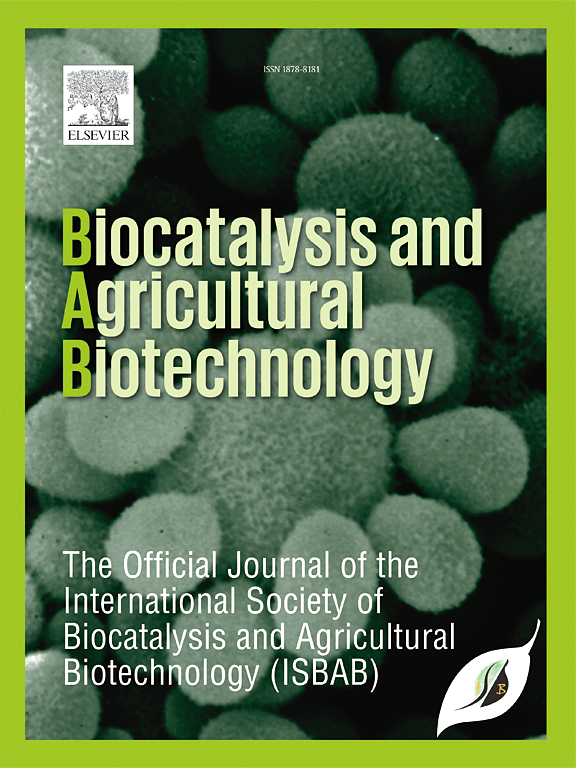Innovative biological control strategies for managing peach tree canker disease caused by Cytospora leucostoma
IF 3.8
Q2 BIOTECHNOLOGY & APPLIED MICROBIOLOGY
引用次数: 0
Abstract
Peach Tree Canker, caused by Cytospora leucostoma, has traditionally been regarded as one of the most severe fungal diseases causing serious economic loss in peach production worldwide. Traditional chemical control methods against this pathogen are often inefficient and threaten environmental and human health. Within the frame of the present study, new alternative methods for biological control of peach tree canker have been investigated, taking advantage of useful microorganisms and plant extracts. Other experiments were conducted to assess the capability of bacterial antagonists to suppress the growth of C. leucostoma in combination with the antifungal properties of different plant extracts. Bacillus subtilis, Pseudomonas fluorescens, and Aspergillus flavus showed 100 % inhibition of C. leucostoma in vitro with 80 % inhibition by Thuja extract. Field experiments showed that applications of these biocontrol agents in separated and combined greatly enhanced canker wound healing by 100 % of infected trees, significantly improving general plant health. The results showed that this combined treatment of bacterial and fungus antagonists with Thuja extract synergistically enhanced the plant's defense mechanisms. It concludes that the biocontrol strategy is an eco-friendly and sustainable alternative to chemical fungicides for an efficient approach to managing peach tree canker in contemporary orchards.
桃树溃疡病生物防治的创新策略研究
桃树溃疡病是由白色细胞孢子菌(Cytospora leucostoma)引起的桃树溃疡病,历来被认为是危害桃树生产最严重的真菌病害之一。传统的化学防治方法往往效率低下,威胁环境和人类健康。在本研究的框架内,研究了利用有益微生物和植物提取物对桃树溃疡病进行生物防治的新方法。另外还进行了其他实验,以评估细菌拮抗剂与不同植物提取物的抗真菌作用联合抑制白葡萄球菌生长的能力。枯草芽孢杆菌、荧光假单胞菌和黄曲霉对金黄色葡萄球菌的体外抑制率为100%,而藤提取物的体外抑制率为80%。田间试验表明,将这些生物防治剂分开或联合施用,可使感染树木的溃疡病创面愈合率提高100%,显著改善植物整体健康状况。结果表明,细菌和真菌拮抗剂与树楸提取物联合处理可协同增强植物的防御机制。结果表明,生物防治是一种生态友好、可持续的化学杀菌剂替代方法,是现代桃树溃疡病防治的有效途径。
本文章由计算机程序翻译,如有差异,请以英文原文为准。
求助全文
约1分钟内获得全文
求助全文
来源期刊

Biocatalysis and agricultural biotechnology
Agricultural and Biological Sciences-Agronomy and Crop Science
CiteScore
7.70
自引率
2.50%
发文量
308
审稿时长
48 days
期刊介绍:
Biocatalysis and Agricultural Biotechnology is the official journal of the International Society of Biocatalysis and Agricultural Biotechnology (ISBAB). The journal publishes high quality articles especially in the science and technology of biocatalysis, bioprocesses, agricultural biotechnology, biomedical biotechnology, and, if appropriate, from other related areas of biotechnology. The journal will publish peer-reviewed basic and applied research papers, authoritative reviews, and feature articles. The scope of the journal encompasses the research, industrial, and commercial aspects of biotechnology, including the areas of: biocatalysis; bioprocesses; food and agriculture; genetic engineering; molecular biology; healthcare and pharmaceuticals; biofuels; genomics; nanotechnology; environment and biodiversity; and bioremediation.
 求助内容:
求助内容: 应助结果提醒方式:
应助结果提醒方式:


